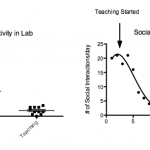
[This question was originally asked on www.reddit.com/r/askscience on Jan 17, 2013]
Why do microorganisms only begin breaking down our tissues after death? What stops them from doing so whilst we are still alive?
The main reason is that our body maintains a multitude of barriers that largely prevent bacteria and other microorganisms from gaining entry. The first and most obvious of these barriers is the skin, but there are also similar barriers along all of your mucosal surfaces (gut, ear, genital tract etc). These barriers consist of cells that are knit together incredibly tightly (google:…
There are a lot of reasons that posts to this blog sometimes don't happen for months at a time, but one of them is that I can often get sucked down the rabbit hole that is Reddit. If you don't know about reddit yet, you may not want to click that link, but if you do know (and you're reading this blog), you may know about one of the communities (subreddits) there - a place called r/askscience. It's a forum where people can ask questions of a scientific nature (anything from "Why are pigeons so successful as an urban animal?" to "What's so special about the speed of light?"), and then actual…
[This past fall, I taught a course at Emerson College called "Plagues and Pandemics." I'll be periodically posting the contents of my lectures and my experiences as a first time college instructor]
In my first lecture, I used Powerpoint (well, technically Keynote), but I personally like chalk-talks a quite a bit more. Never mind the fact that classrooms never seem to have chalk boards any more, I like taking the time to write out important points, draw diagrams on the fly and connect with the material a bit more than just clicking through to the next slide. My students did not…
[This past fall, I taught a course at Emerson College called "Plagues and Pandemics." I'll be periodically posting the contents of my lectures and my experiences as a first time college instructor]
Most of this post was written back in September, when it still seemed possible that I would be able to teach the class, write the blog and do science. Please forgive any anachronisms that I failed to purge.
Last time, I talked about what science is and why it's awesome. This is the first half of lecture 2, which was originally given on 11 September, 2012.
Lecture 2a (reading: Zimmer - The…
I disappeared for a while to teach a class. At the outset I had grand plans - Not only would I design the course from scratch, give the lectures, and grade the assignments, I would also write up all of the lectures for the blog and maintain my same level pf productivity in the lab. Unfortunately, it quickly became clear that in order to accomplish this goal I would either need to give up sleeping or find one of those time-warp thingies from the 3rd Harry Potter book.
Neither of those options seemed reasonable, and so this blog, and indeed my productivity in lab suffered quite a bit.
The…
[This fall, I'm teaching a course at Emerson College called "Plagues and Pandemics." I'll be periodically posting the contents of my lectures and my experiences as a first time college instructor]
Lecture 1
That was a scene from Monty Python's Holy Grail, demonstrating the lighter side of the plague. Who knew there was a lighter side of plague? Of course the darker side is easier to envision. This is a graph showing estimated human population over the last millenium. That enormous dip during around 1350 is not a result of people having less babies - as much as 10-20% of the entire human…
For the past 3 years, I've had the opportunity to spend a week in a house on a beautiful lake in Vermont. Usually, this week is a chance to completely unplug. I take some photos, buy a bunch of books from Northshire and read them, and lounge around. On this past trip however, I received and e-mail that was equal parts wonderful, exciting and terrifying, offering me an opportunity to teach a course at Emerson College.
The course is SC-214 - Plagues and Pandemics. From the catalogue:
Infectious diseases are a leading worldwide cause of human death. This course will describe and discuss the…
A mini furor erupted this weekend, when republican Senate nominee Todd Akin defended his position of denying abortions even to victims of rape, because in the case of "legitimate rape," women have biological defenses that prevent pregnancy:
“First of all, from what I understand from doctors [pregnancy from rape] is really rare,” Akin told KTVI-TV in an interview posted Sunday. “If it’s a legitimate rape, the female body has ways to try to shut that whole thing down.”
The liberal blogosphere went nuts, and the story was picked up by all the national media outlets, and even Mitt…
While going back through blog archives and reviewing incoming links, I stumbled on this post from about a year ago from Zen Faulkes at Neuro Dojo:
There are many reasons to argue for open access of scientific research. But this is not the best one:
It’s your taxes that fund the research, you should have access to the results without me or anyone else being a mediator.
That one is from Kevin at We, Beasties. When I protested that this argument omits indie science, Kevin replied that it’s such a small amount as to be not even worth considering.
I object to this…
In case you missed it, over the past couple of days there have been reports of an outbreak of Ebola hemorrhagic fever virus in Uganda. As of this writing, the most recent report I've seen puts the death toll at 16, with a few other suspected cases. Ebola is terrifying for a number of reasons - it's readily transmissible, it has a remarkably high and rapid lethality (25-90% case fatality rate within days to weeks), and the way it kills is gruesome - causing massive bleeding from all orifices. There's no vaccine or cure.
The good news from an epidemiology standpoint…
The vast majority of funding for biological research in the US comes from the National Institutes of Health (NIH), and as a result, most of our grants are written in a way that plays up the clinical importance of our work. Some variant of the phrase,
This research has implications in the treatment/prevention of [insert disease here]...
appears in just about every grant and research paper in my field. In truth, it's often very difficult to draw a direct line between a specific research project and a drug that your doctor can prescribe. We like to pretend that we can leverage research to…
The kinks continue to get ironed out one by one after our massive migration. Most of the major problems are happening on the backend, and are likely invisible to you guys (except for the fact that some typically prolific posters have slowed down a bit), but there are a couple of things that I've noticed that probably will affect you.
The biggest one is the RSS feeds, and specifically the "select" feed. If you usually use RSS to keep up to date on the blogs here, your old links are probably broken (at least, all of the one I had were). If you look at the right sidebar, there's a link to a new…
In honor of the great Scienceblogs migration, and inspired by Ethan's wonderful post about the migration of the universe, I thought I would talk about something on a smaller scale: cell migration.
The scale is small, but the problem is huge. Most of your organs are locked in place - your heart never needs to be in your thigh - but the immune system has to be everywhere. When you cut your toe, breathe a virus into your lungs or eat a piece of contaminated spinach, the immune system needs to be johnny-on-the-spot with the inflammatory response.
Thankfully, there's already an organ system that…
Last week, I had the privilege of attending the launch of a new initiative from the Union of Concerned Scientists - The Center for Science and Democracy. The UCS itself was founded in the late 1960's in response to the Cold War nuclear arms race. Graduate students and faculty at MIT decided that someone needed to advocate for "greater emphasis on applying scientific research to pressing environmental and social problems rather than military programs." That goal seems even more important in today's political climate, though the issue today is not between environment/society…
Welcome to the new Science Blogs. You might have noticed some changes around here - let us know which changes you like and which you don't. One of the biggest things affecting your experience is the comment system - you can now reply directly to other people's comments, and you can login so you don't have to re-enter all your information each time (though you can still comment without logging in if you prefer). The moderation system is quite a bit easier from my end, which shouldn't affect you much, but will probably reduce the number of legitimate comments that get buried in the spam folder…
I'll just leave this post up and edit it as needed when I need to check the features... don't mind me.
Picture:
This is a picture of a buff dude climbing
No technology is inherently good or evil, it's the use of that technology that determines its value. A blade can be used in surgery to save a life, or as a weapon to take one. The ballistics that enable missiles to destroy enemies also enables the launch of communication satellites and exploration of other worlds. For quite a while, I've been reading +Jeff Jarvis' commentary on these issues in the realm of the internet. His principal argument is that regulation that aims to block technology in order to keep people safe will also block the innovation and potential benefits of that technology…
A few months ago, I wrote about the problems with academic publishing:
These days, there's an entire industry of academic publishers that have become so fully integrated into the research system that many scientists don't realize that there's any distinction between doing science and publishing in journals. However, these journals cost an enormous amount of money (mostly public tax dollars), yet add little value to scientific research, while simultaneously slowing the pace of discovery and limiting the dissemination of knowledge.
Many individual scientists have taken personal action to combat…
Yesterday on Marketplace, there was a great piece by Alex Chadwick on the fate of all the oil released during the BP oil spill two years ago.
Oil is a product of organic matter that was deposited many, many years ago. It's gone through many, many changes deep in earth under high pressure, high temperature -- but fundamentally it's an organic material.
This is hard to grasp. Oil is food, an organic buffet for microbes. So, two years ago, when the BP oil plumed in the water, very soon the bacteria plumed, too. Different kinds in different parts of the ecosystem -- deep water, shallow, shoreline…
My birthday was last week, which means I get a whole new chance to set some New Year's resolutions. My regular readers (all 3 of you) might have noticed a serious dearth of posting lately. I have many excuses:
1) I'm (hopefully) coming up on my last year as a PhD student, and I'm in serious data-generation mode.
2) I've been spending more time on climbing, photography, and other things that are not science-related in order to give my brain some down time.
A photo I took of 2 friends on the side of Mt Cannon in New Hampshire
3) The current back-end of Scienceblogs is truly awful. While…


